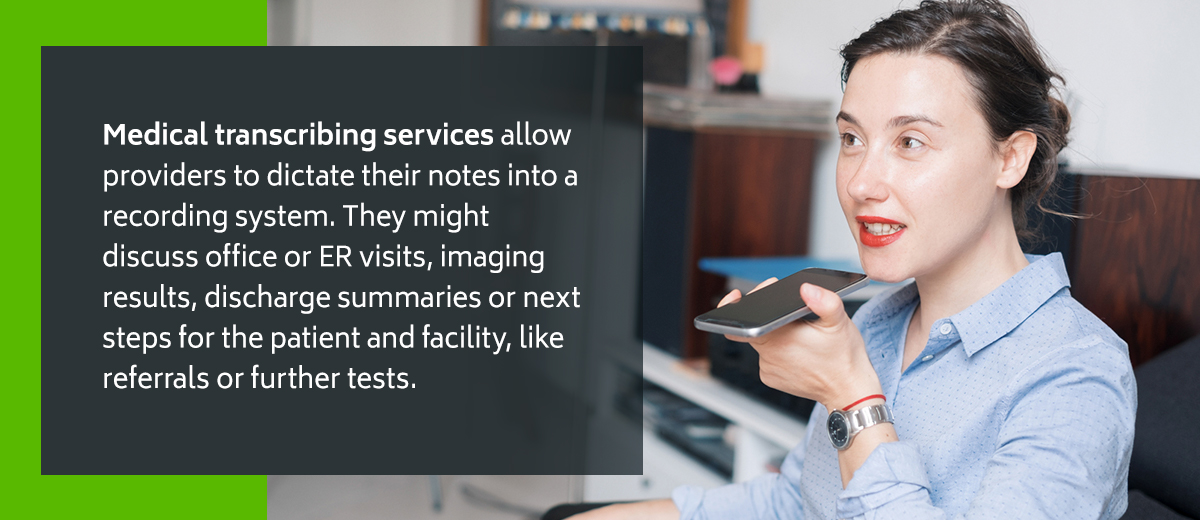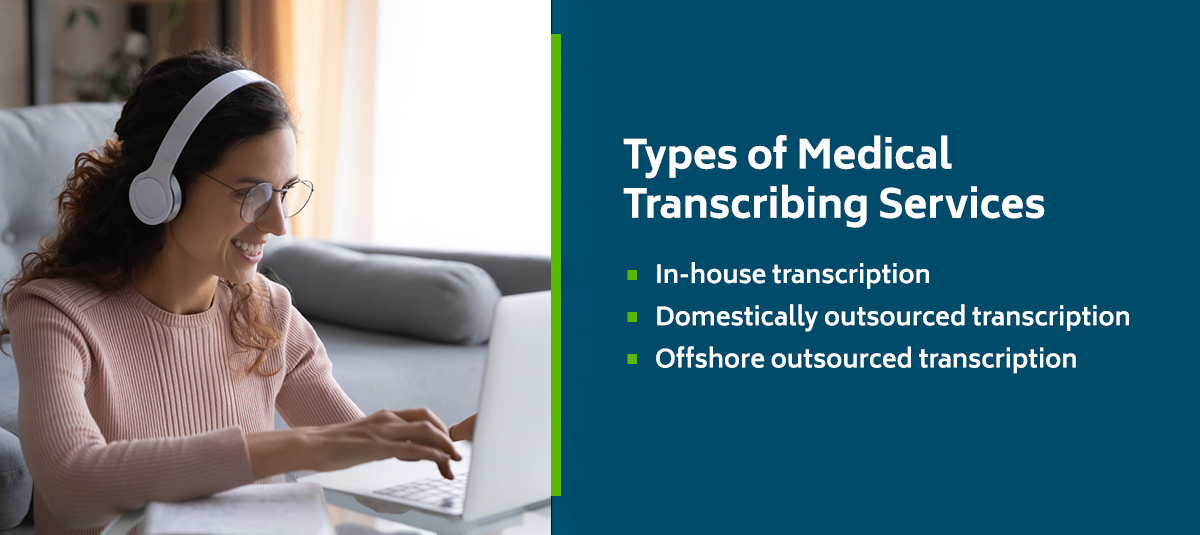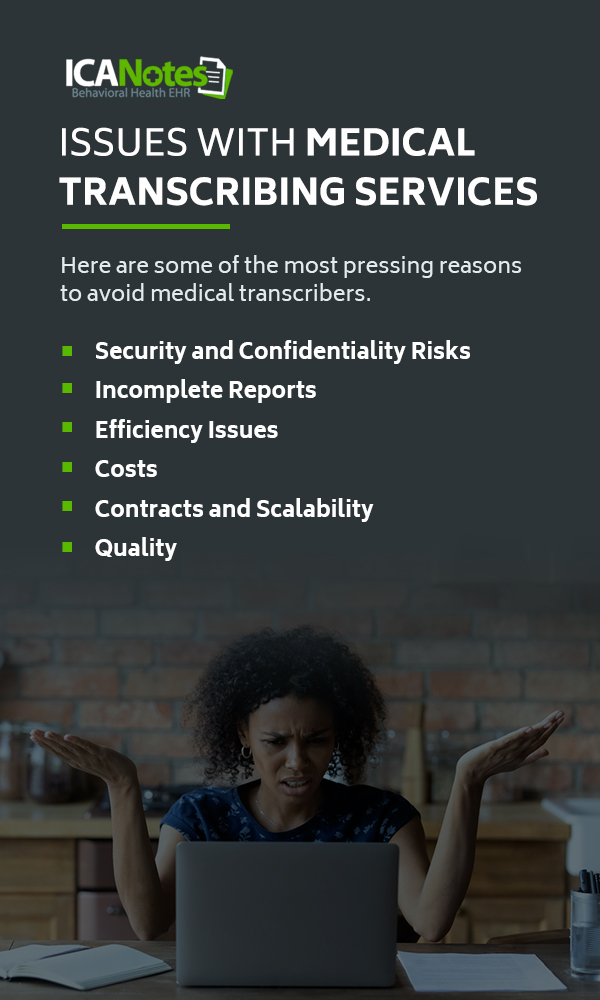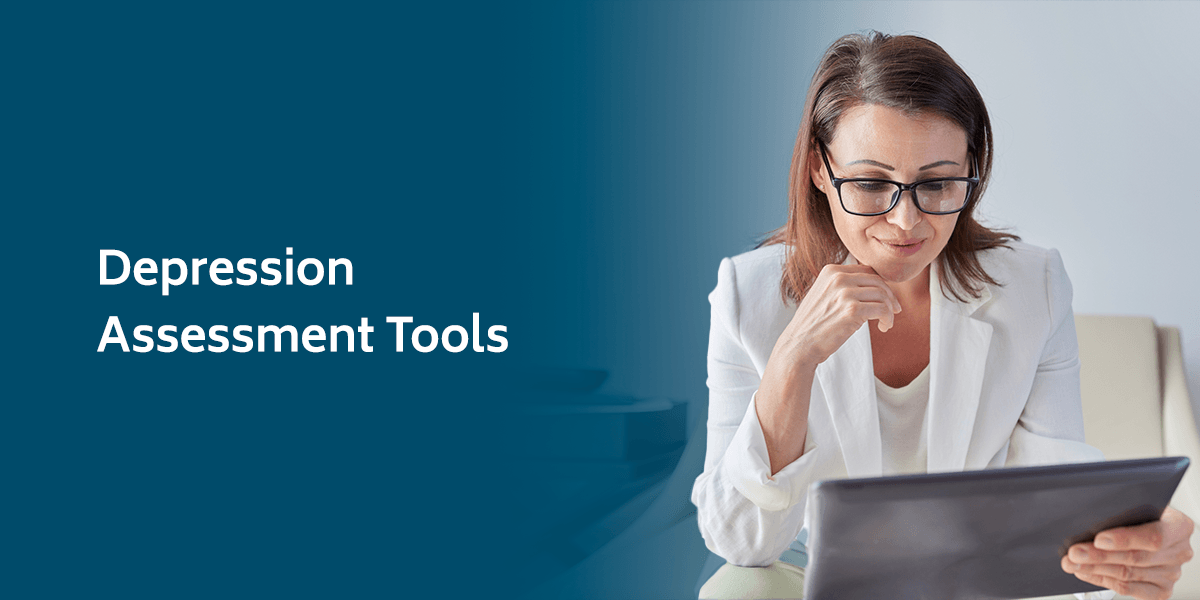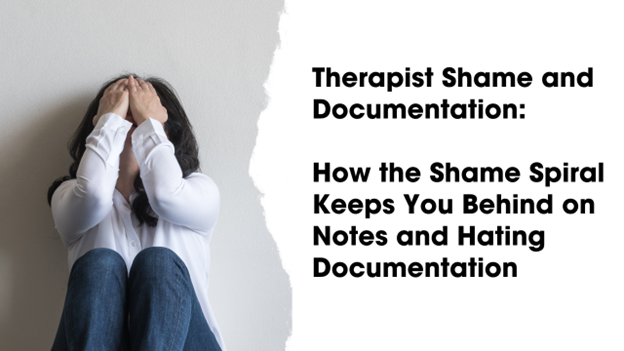6 Reasons Why You Should Avoid
Medical Transcribing Services
Amidst record rates of burnout in healthcare, some practices have turned to medical transcription services to ease the burden on providers, allowing them to dictate their notes and have them entered into the system by another person. But this solution is far from perfect. Although it might reduce the time providers have to spend on paperwork, it also comes with significant risks for everything from security to accuracy.
Thankfully, transcribing isn't the only option. Let's take a closer look at medical transcribing services, including reasons to avoid medical transcribers and some tips for taking quick medical notes without them.
Instant Webinar
Tips for Writing Better Mental Health SOAP Notes
Access our informative live webinar to learn how you can more efficiently follow the SOAP format while creating individualized narrative notes that will withstand scrutiny from any regulatory entity.
- History of the SOAP note
- Detail of the SOAP format
- How to create SOAP notes efficiently
What Are Medical Transcribing Services?
Medical transcribing services allow providers to dictate their notes into a recording system. They might discuss office or ER visits, imaging results, discharge summaries or next steps for the patient and facility, like referrals or further tests. The providers have the flexibility to dictate their notes while on the move or while completing another task.
These recordings could be stored on a smartphone or dedicated recording device, after which the digital file is sent to the transcribing service. Another option is to initiate a secure phone call and dictate notes through that.
Once information moves on to transcription, a person — who may or may not be well-trained in medical terminology — enters the information from the audio recording into the practice's electronic health record (EHR). The provider doesn't need to sit down at a computer and manually enter these updates to complete documentation. It is more hands-off for the clinician.
One of the main purposes of medical transcription is to free up time for providers and help address the issue of too much paperwork, but it always involves a middleman. This extra party creates many of the problems associated with medical transcribing services, like the extra expenses associated with the service or errors caused during transcription.
Types of Medical Transcribing Services
Medical transcription services can vary widely in how they are set up and what kind of results they offer, which increases the challenge for practices looking to implement one. Each style of medical transcription comes with different risks and benefits. The three main options for medical transcription services include:
- In-house transcription: A practice might have a dedicated team of transcriptionists to take care of the task. This option is usually the most expensive, but it tends to be the most secure since the data doesn't need to leave the facility. It also offers a little more control over staffing, so you could make sure your medical transcriptionists are well-trained for the job. Still, in-house transcription can introduce more opportunities for errors and increase the costs associated with the service.
- Domestically outsourced transcription: You could also use a third-party transcription service. Ideally, these companies would be thoroughly vetted and compliant with the Health Insurance Portability and Accountability Act (HIPAA). Unfortunately, this isn't always the case, as some transcribing companies may not follow strict security standards. Another issue is that some U.S.-based companies are shell corporations for overseas companies, making it easy for them to close shop if any consequences appear, such as HIPAA violations or significant errors.
- Offshore outsourced transcription: If you go straight to a foreign service provider, you are likely working with a business with few restrictions and standards to follow. They may not be as familiar with HIPAA or healthcare protocols as a U.S.-based company. Direct access to your EHR could put you at risk for malware and breaches. It's hard to hold these overseas companies accountable if you come under fire for security breaches or errors.
Outsourced transcription is particularly risky due to concerns over HIPAA violations. Offshore providers may be completely out of reach, while onshore shell companies could simply close up shop at the first sign of trouble. As with any third-party business agreement, you must perform due diligence and choose a service provider that doesn't create undue risk for your patients.
Issues With Medical Transcribing Services
All types of medical transcription can come with problems, particularly surrounding security and quality. Here are some of the most pressing reasons to avoid medical transcribers.
1. Security and Confidentiality Risks
Medical transcribing can pose significant security risks, particularly when outsourced to a third party. To offer transcription, service providers need access to the practice's EHR and patients' personal health information (PHI). HIPAA-covered entities have a serious responsibility to protect patient data, meaning they cannot entrust it to a risky company and must take steps to confirm a partner's capability to keep information secure.
Even with a business associate agreement (BAA) — which usually helps businesses share responsibility for data security — a breach could still have consequences for the practice that hired a dicey transcription service. HIPAA-covered entities are still expected to perform due diligence through a risk assessment. They must ensure the partner is trustworthy enough to handle PHI. If you're outsourcing your transcription, you'll need to be extremely careful to verify a service provider's trustworthiness. It can be difficult to hold some companies accountable if a data breach were to occur.
Despite confidentiality agreements and BAAs, medical transcribing services can create significant risks for a provider. A more secure approach to reducing paperwork is to avoid involving a third party altogether, such as by implementing time-saving tools into your EHR for the provider to use directly.
2. Incomplete Reports
Medical billing and procedures have complex requirements. Reports need to be comprehensive and reliable to support operations and improve care. If medical transcriptions aren't complete, they may leave gaps, which can cause delays or frustrating back-and-forths with various parties involved in care. A referral might lack important information needed for a diagnosis, while an insurance claim could be missing data necessary for payment or pre-approval. Incomplete reports can create problems for patients and even affect quality of care.
Whether from incomplete dictation or errors in the transcription itself, transcribed reports could lack key data required for effective documentation, both within a practice and with other parties, like insurance companies and other providers. Even if all the necessities are there, your notes might not look quite the way you want them to.
Therapy providers, for instance, need to write detailed notes about what goes on in a session. If reports contain the bare minimum, they may hinder the patient's progress. Reports generated by a transcription service may not include all the details you would want for notes that truly help you offer individualized care in your unique field or practice.
3. Efficiency Issues
Transcription services take time. If transcribers are busy, it might be days or weeks before transcriptions are finished. These delays might impact treatment or various medical processes. The patient doesn't receive information in a timely manner and, in many cases, receives a lower quality of care.
Say a patient's insurance company needs data on an assessment before it will cover surgery. If not processed quickly, the patient may have to delay surgery, potentially worsening their condition. Similarly, slow documentation could delay referrals to other providers or the provision of other services, including in the behavioral health field. Certain departments or employees rely on charts and reports to deliver care and conduct everyday operations like billing. Without timely documentation, your practice might have some difficulty meeting efficiency demands.
Improving documentation at the point of charting can help you avoid these delays and keep things moving smoothly. Instead of handling notes after the fact, immediate charting and reports can ensure timely care.
4. Costs
Paying for medical transcription services will cost you, whether you opt for in-house or outsourced solutions. Domestic outsourcing is usually less expensive than setting up transcription services in-house, but it will still be a significant dent in your budget. Offshoring could save even more, but you might be creating more risks through potential lawsuits or HIPAA violations.
As you can imagine, these costs can significantly outpace the cost of medical transcription itself. Fines for HIPAA violations start at $100 to $50,000 per violation. While you might save upfront, the cost of a poor transcription partner can be incredibly costly.
In addition to financial impacts, transcription problems could cost you in other ways, such as increased labor requirements or a damaged reputation. If you're frequently dealing with errors or fixing problems associated with transcription, you'll also be paying for the labor hours it takes to address those issues. You may also need to comb through transcribed reports to check for accuracy. Problems, like violations or frequent treatment delays, could also steer potential patients away and give your practice a poor image.
5. Contracts and Scalability
Medical transcriptionist services typically come with contracts. You might be locked into service for a certain length of time. If your practice's needs change, you may not be able to adjust your contract or make alterations you need to operate effectively. Another concern is that the transcription service provider might change their service model or otherwise alter their offerings, leaving you stuck in the contract.
If you run transcription in-house, you'll also need to consider staffing demands and how you'll handle fluctuating transcription requirements. Will it be easy to add on team members when needed, or will onboarding take a lot of time? Your practice's capacity to manage this team will influence the success of medical transcription.
While medical transcription is one method to reduce documentation requirements, you can also consider changes that are wholly under your control, such as policies, equipment, or your EHR. This way, you won't need to worry about being locked into service or dealing with changes made by a third-party provider.
6. Quality
With medical transcription services, you're relying on the transcriptionist to write the notes accurately. In the medical world, tiny typos or misunderstandings can have big ramifications, so these errors can't be taken lightly. Inaccuracies may come from poor-quality recordings, poorly trained transcriptionists, or simply human error. Your transcriptionists may or may not have adequate training and a strong understanding of the U.S. behavioral health field, especially if they're sourced from another country.
You might also struggle with quality if you use “rush” service transcription, in which transcriptionists must work even faster to meet demands and might be more prone to errors.
Whatever the reason, these errors are not acceptable. Even the smallest of errors can lead to significant problems — for instance, hyperglycemia and hypoglycemia are two very different states, and typing the wrong one could cause a severe problem down the road. The cost of errors is incredibly high in the medical field and should be one of the top concerns for anyone seeking medical transcription services.
Even if your transcriptions are error-free, they may not be as strong as you would like them to be. For therapy services specifically, detailed, individualized notes and assessments are vital for making progress. Since medical transcribing is performed by a third party and not the clinician, notes may be more generic and lack the detail or nuance that many providers want. If you're working with professionals across disciplines, good notes are even more important so everyone stays on the same page and understands the patient's needs.
If you're looking to make your notes as strong as possible, medical transcribing services often won't get you there.
Alternatives to Medical Transcribing Services
Although medical transcribing services may not be ideal, most practices still need some way to ease the paperwork burden and give providers as much time as possible to focus on the patient. Since documentation is usually one of the most time-consuming tasks in a clinician's workday, a great place to start is by assessing your charting practices.
One solution to taking medical notes is to use speech recognition tools, which transcribe audio without the need for another person. These programs can be sophisticated, but they usually still require checks to ensure accuracy. These checks can take up time, and there's still the possibility of missed errors.
Another strategy is to consider improvements to your EHR. By implementing the right tools, you might be able to simplify and streamline the workday for providers. In behavioral health, for example, there's ICANotes. ICANotes limits the amount of time providers spend on paperwork through a wide variety of tools, all while ensuring high quality, reducing risk and maximizing reimbursement. ICANotes allows clinicians to quickly build comprehensive, individualized records without spending hours on charting or outsourcing dictation to a third party.
In addition to charting, ICANotes can save time through tools for patient self-service, billing and practice management. Suitable for a range of settings and tasks, ICANotes serves inpatient, outpatient and sub-specialty providers with tools and templates for assessments, progress notes, treatment plans and more.
If you're considering medical transcription to reduce clinician paperwork demands, consider revisiting your EHR instead. A program designed for your type of work and packed with tools for efficiency and quality can limit the number of hours spent charting without sacrificing security or quality.
Avoid Medical Transcribing Services in Behavioral Health
For behavioral health providers, ICANotes is the ideal alternative to medical transcription services. If you're looking for a way to improve and speed up documentation in your practice, we can help with an easy-to-access and intuitive program designed for behavioral health. Our cloud-based platform comes with quick implementation and can help you continue to offer high-level services with improved efficiency.
Learn more about how ICANotes can help your practice and reach out to us today!


